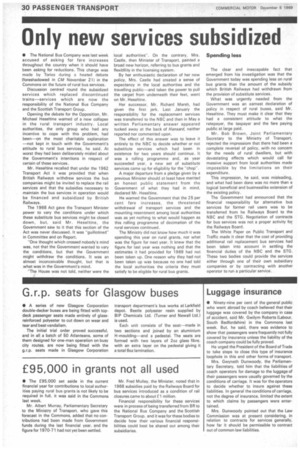Only new services subsidized
Page 32

If you've noticed an error in this article please click here to report it so we can fix it.
• The National Bus Company was last week accused of asking for fare increases throughout the country when it should have been asking for reductions. This charge was made by Tories during a heated debate (foreshadowed in CM November 21) in the Commons on the future of rural bus services.
Discussion centred round the subsidized services which replaced discontinued trains—services which are now the responsibility of the National Bus Company and the Scottish Transport Group.
Opening the debate for the Opposition, Mr. Michael Hese'tine warned of a new collapse in the rural transport industry. Local authorities, the only group who had any incentive to cope with this problem, had been—on the most charitable explanation —not kept in touch with the Government's attitude to rural bus services, he said. At worst they had been deliberately misled about the Government's intentions in respect of certain of these services, Mr. Heseltine recalled that under the 1962 Transport Act it was provided that when British Railways withdrew services the bus companies might be invited to replace the rail services and that the subsidies necessary to maintain the bus services in operation would be financed and subsidized by British Railways.
The 1968 Act gave the Transport Minister power to vary the conditions under which these substitute bus services might he closed down, but, said Mr. Hese!tine, the Government saw to it that this section of the Act was never discussed. It was -guillotined" in Committee and on Report.
"One thought which crossed nobody's mind was, not that the Government wanted to vary the conditions, but that the Government might withdraw the conditions. It was an almost inconceivable thought. but that is what was in the Government's mind.
"The House was not told, neither were the local authorities". On the contrary, Mrs. Castle, then Minister of Transport, painted a broad new horizon, referring to bus grants and flexibility in the licensing system.
By her enthusiastic declaration of her new policy, Mrs. Castle had created a sense of expectancy in the local authorities and the travelling public---and taken the power to pull the carpet from underneath their feet, went on Mr. Heseltine.
Her successor, Mr. Richard Marsh, had given the first jerk. Last January the responsibility for the replacement services was transferred to the NBC and then in May a written Parliamentary answer appeared tucked away at the back of Hansard, neither reported nor commented upon.
The effect of this answer was to leave it entirely to the NBC to decide whether or not substitute services which had been in existence for two years should continue. It was a rolling programme and, as year succeeded year, a new set of substitute services came up for eligibility for the "chop-.
A major departure from a pledge given by a previous Minister should at least have merited an honest public statement from the Government of what they had in mind, declared Mr. Heseltine.
He warned the Government that the 25 per Cent fare increases, the threatened withdrawal of transport services and the mounting resentment among local authorities was as yet nothing to what would happen as this rolling programme of decimation of the rural services continued.
The Ministry did not know how much it was spending this year on rural grants, nor what was the figure for next year. It knew that the figure for last year was nothing and that the estimates it had provided for 1969 had not been taken up. One reason why they had not been taken up was because no one had told the local authorities the criteria they must satisfy to be eligible for rural bus grants. The clear and inescapable fact that emerged from his investigation was that the Government today was spending less on rural bus grants than the amount of the subsidy which British Railways had withdrawn from the provision of substitute services.
What was urgently needed from the Government was an earnest declaration of policy in respect of rural buses, said Mr. Heseltine. They must make it clear that they had a consistent attitude to what the ratepayer, the taxpayer and the fare paying public at large paid.
Mr. Bob Brown, Joint Parliamentary Secretary to the Ministry of Transport, rejected the impressiom that there had been a complete reversal of policy, with no concern for the needs of rural dwellers, but with devastating effects which would call for massive support from local authorities made impossible by the limitations on their expenditure.
This impression, he said, was misleading, 'and what had been done was no more than a logical beneficial and businesslike extension of the existing policy.
The Government had announced that the financial responsibility for alternative bus services for former rail users was to be transferred from he Railways Board to the NBC and the STG. Negotiation of contracts for bus services was not a proper activity for the Railways Board.
The White Paper on Public Transport and Traffic made it clear that the cost of providing additional rail replacement bus services had been taken into account in settling the financial duties of the NBC and the STG. These two bodies could provide the services either through one of their own subsidiary companies or by contracting with another operator to run a particular service.






















































































































































